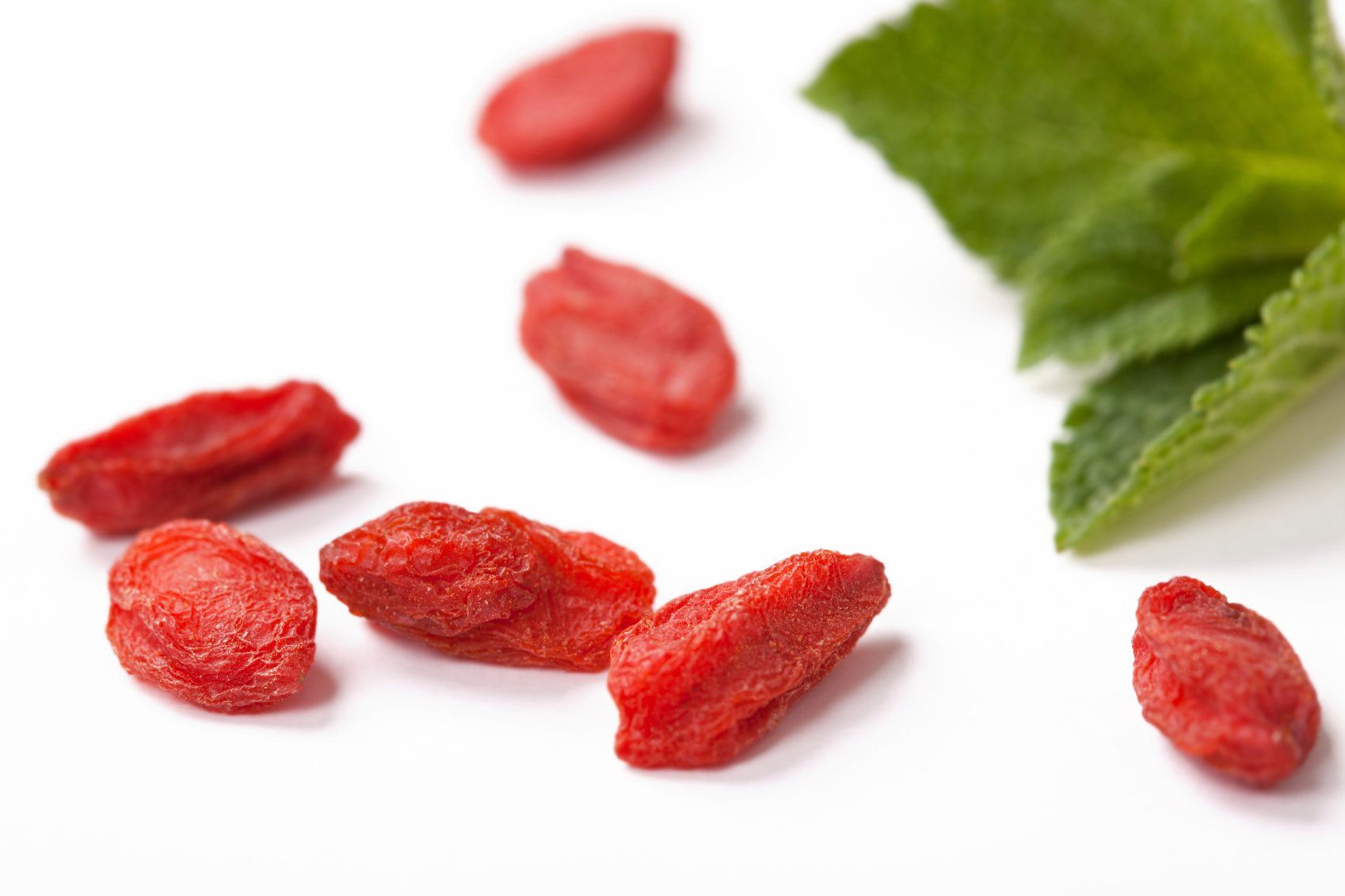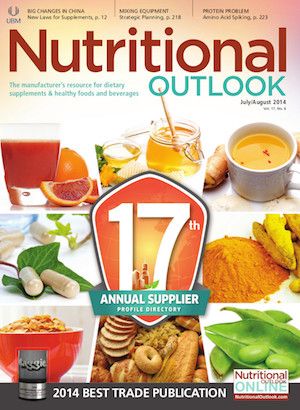Four Botanicals to Watch
Goji berry, reishi mushroom, ginger, and blueberry have had strong sales in the past couple of years.

Consumer interest in natural health is driving the sales growth of many key botanical extracts. Four in particular-goji berry, reishi mushroom, ginger, and blueberry-have had strong sales in the past couple of years and are poised for even greater growth this year. Let’s take a look at the most significant science supporting these ingredients.
Goji Berries
Goji berries (Lycium barbarum) became popular several years ago through the spectacular marketing success of multilevel marketing companies who extolled goji berry’s benefits, including energy, immune function, eye health, and libido support. These benefits first became evident in traditional Chinese medicine; later, they were backed by scientific studies. The raw, dried berries are now widely available in grocery and natural food markets. GRAS status allows the extract to be used in food products, opening the door to many new products.
Goji berries are rich in polysaccharides, which are key active compounds in supporting immune health, as well as carotenoids, which support eye health. In a human clinical study for immune health, 60 older healthy adults consuming 20 ml/day of goji berry juice for 30 days had a statistically significant increase in the number of lymphocytes and levels of interleukin-2 and immunoglobulin G.1 Lymphocytes are white blood cells that fight against bacteria, viruses, and parasites. Interleukin-2 is a compound secreted by T-lymphocytes that directs the function of other T-lymphocytes. Immunoglobulin G is a type of antibody most abundant in the blood that helps neutralize diverse pathogens. Study subjects also reported improved general feelings of well being related to fatigue and sleep.
Reishi Mushroom
Reishi mushroom (Ganoderma lucidum) supplements are seeing greater use for immune-health support and for providing calming, anti-stress effects. In traditional Chinese medicine, the mushroom is used as a spirit tonic for its relaxing, tonifying (strengthening or improving) effect on the mind.
A study evaluated the anti-stress and immune-protective effects of a polysaccharide-rich reishi extract in 40 male football players training in high altitude–simulated conditions, such as low oxygen (hypoxia), for 28 days.2 The minimum dosage of reishi extract was 10 capsules/day, which the study researchers said helped to prevent one type of immune dysfunction of cell-mediated immunity-namely, a reduction in the decrease of T-helper cells to T-suppressor cells, indicating less immune depression. Another placebo-controlled clinical study on the same polysaccharide-rich extract showed that the extract was helpful in improving a form of mental fatigue and stress known as neurasthenia.3Ginger
Ginger (Zingiber officinale) is a food spice and supplement that is growing in popularity for supporting many health conditions, from stomach health and other digestive issues to joint comfort. In vitro studies have shown that ginger has potent effects on the inflammation-mediating enzyme cyclooxygenase 2 (COX) and lipoxygenase (LOX).4,5 A ginger extract standardized to gingerols provided significant pain and disability relief in the first three months at a dosage of 250 mg, four times/day, in 29 patients suffering from arthritis of the knee.6
For digestive health, 1,200 mg of a ginger supplement was shown to be effective for stimulating gastric function in healthy volunteers. A separate study found ginger helpful for relieving nausea from motion sickness.7,8Blueberry
Blueberry (Vaccinium corymbosum) was one of the first “superfruits” on the market, after a culmination of studies revealed many health benefits, from cardiovascular to antiaging and cognitive improvement. Fresh blueberries are seasonal, and frozen blueberries can be inconvenient to use on a regular basis. Thus, researchers have embarked on clinical studies to demonstrate the capability of blueberry polyphenol extracts to improve health, as the dietary supplement form may be a more convenient way for people to consume blueberry extracts regularly.
A clinical study on a blueberry flavonoid extract tested the extract’s cardiovascular health effects by measuring blood flow-mediated dilation at a lower dose (766 mg), as well as at two other higher doses. Researchers noted that only the lower, 766-mg dose was required to achieve the benefit. There were significant increases in blood flow and decreases in inflammatory neutrophil activity within 1-2 hours after consumption and after 6 hours post-consumption.9
Blueberries may also pose benefits for brain function and mood. A study on wild blueberry juice involving nine older adults who had early memory changes after 12 weeks showed improved paired associate learning and word list recall, and an increase in trends that suggest reduced symptoms of depression.10
While all of these herbs and foods have been used traditionally, their extracts and juice concentrates have made it possible for researchers to validate their uses in western evidence-based applications requiring more-rigorous scientific studies. With strong, evolving science, these four ingredients have a very high potential for promoting health.
References
- Amagase H et al., “Immunomodulatory effects of a standardized Lycium barbarum fruit juice in Chinese older healthy human subjects,” Journal of Medicinal Food, vol. 12, no. 5 (October 2009): 1159-1165.
- Zhang Y et al., “Effect of Ganoderma lucidum capsules on T lymphocyte subsets in football players on "living high-training low",” British Journal of Sports Medicine, vol. 42, no. 10 (October 2008): 819-22. Epub Nov 29, 2007. Erratum in British Journal of Sports Medicine, vol. 43, no. 4 (April 2009): 310-311.
- Tang W et al., “A randomized, double-blind and placebo-controlled study of a Ganoderma lucidum polysaccharide extract in neurasthenia,” Journal of Medicinal Food, vol. 8, no. 1 (Spring 2005): 53-58.
- Van Breemen RB et al., “Cyclooxygenase-2 inhibitors in ginger (Zingiber officinale),” Fitoterapia. Epub Septebmer 15, 2010.
- Kiuchi F et al., “Inhibition of prostaglandin and leukotriene biosynthesis by gingerols and diarylheptanoids. Chemical & Pharmaceutical Bulletin, vol. 40, no. 2 (February 1992): 387-391.
- Wigler I et al., “The effects of Zintona EC (a ginger extract) on symptomatic gonarthritis,” Osteoarthritis and Cartilage,vol. 11, no. 11 (November 2003): 783-789.
- Hu ML et al., “Effect of ginger on gastric motility and symptoms of functional dyspepsia,” World Journal of Gastroenterology, vol. 17, no. 1 (January 2011):105-110.
- Lien HC et al., “Effects of ginger on motion sickness and gastric slow-wave dysrhythmias induced by circular vection,” American Journal of Physiology. Gastrointestinal and Liver Physiology. Vol. 284, no. 3 (March 2003): G481-489.
- Rodriguez-Mateos A et al., “Intake and time dependence of blueberry flavonoid-induced improvements in vascular function: a randomized, controlled, double-blind, crossover intervention study with mechanistic insights into biological activity,” American Journal of Clinical Nutrition, vol. 98, no. 5 (November 2013): 1179-1191.
- Krikorian R et al., “Blueberry supplementation improves memory in older adults,” Journal of Agricultural and Food Chemistry, vol. 58, no. 7 (April 14, 2010): 3996-4000.
Photo © iStockphoto.com/Cio18














